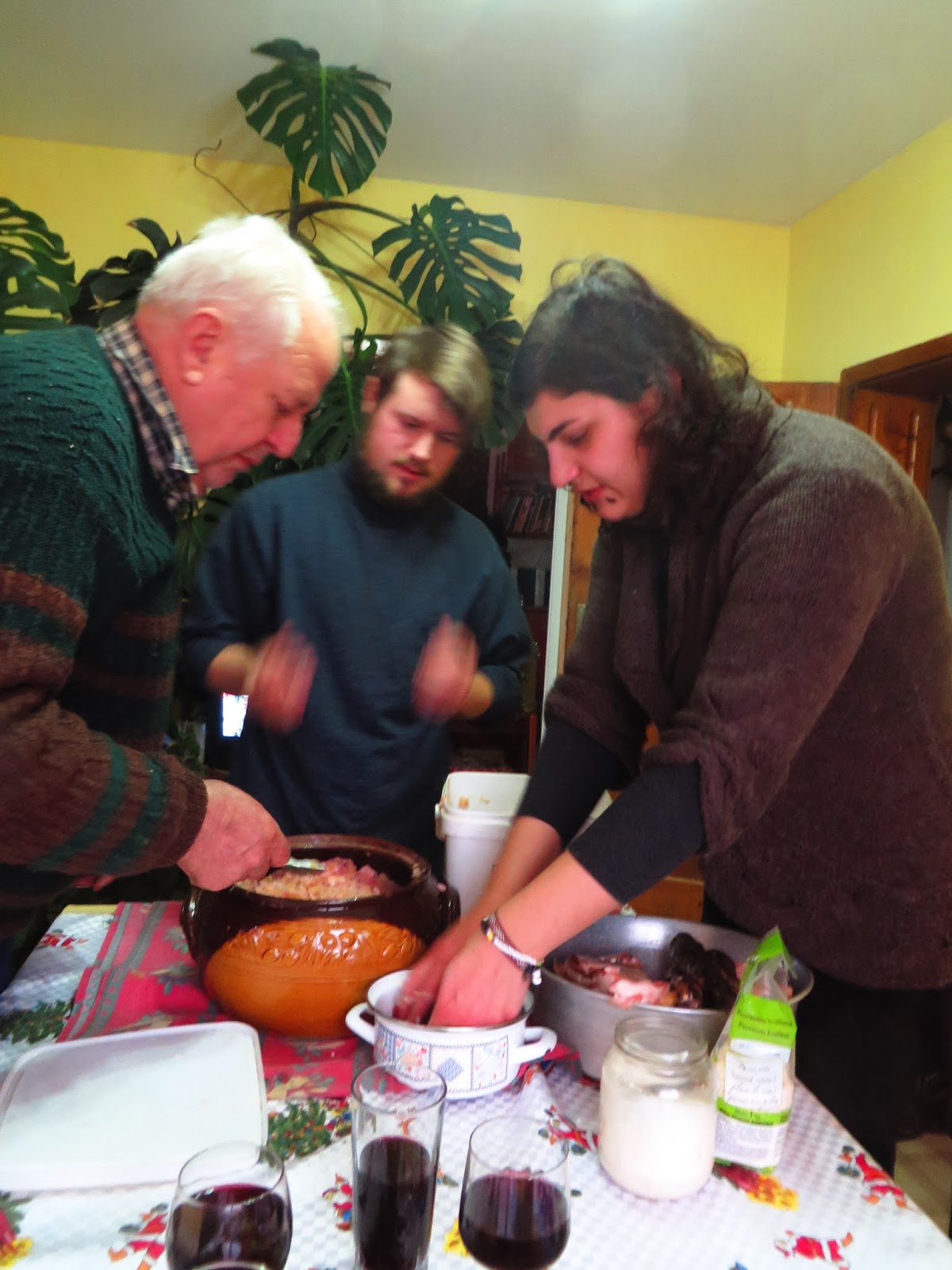Christmas holidays and new year celebration are behind us, and it was a good time to test local Bulgarian cuisine traditions. EVS team from Rebrovo (Kristaps, Pierre, Inese and Baiba) had a wonderful chance to visit Velingrad – family of our organisation’s president Marina. Who else, but the grandmothers, are able to present local traditional cuisine, right? And I am not talking about Shopska salata or banitsa because I think we know enough about that. This time we will go a little... deeper.

First breakfast made us a little nervous, because we didn’t know what to expect. But then we saw a small kettle on the table and after the first „заповядайте” we sat down. And we begun our holidays with Yufka (Юфка) which I would like to call a kind of Bulgarian pasta. But completely home made. First thing they do is preparing a dough from milk, eggs, salt and flour. And the main idea is to prepare it so big and thin as a paper. Then it is baked and in the next morning broken in small pieces and boiled as a regular pasta. It was served with sirene and sugar –tasted like a light desert, in my opinion it is good for breakfast or dinner.


Bulgarian cuisine has a special menu for the 24th of December - Christmas eve (бъдни вечер), because a lot of people are fasting 40 days till Christmas and are not eating meat or any other products of animal origin (some of them are just not eating meat in this time). Special kind of bread is served fresh and warm with one leva baked in it. The one who gets a piece with coin will be rich in next year. But the main meal in this evening was beans. A lot of them. They were served together with grape-leave-rolls with rice (сарми с лозови листа) and sweet peppers filled with beans and spices (чушки с суфенка). Of course we found Lutenitsa (лютеница) and Chubritsa (чубрица) as a perfect addition to the main meal. And when it was time for desert we had a carved pumpkin filled with dried fruits, cinamon and brown sugar. This one was prepared by us under the strong supervision of Marina, because this is considered her specialty of the house. :)
The most important meal is on December 25th – the Christmas day was Ka-pa-ma (Капама). For a begginer this could be scary or bizarre, but Latvians prepare something really similar for Christmas. I was participating in the preparation of Kapama and the grandfather Ivan taught me the secrets of Kapama. As I understood – it’s a duty of the men to cook Kapama. The recipe is not that difficult actually. Firstly you must have a big clay kettle where to put the ingredients. Then you have to put inside a lot of sour cabbage (which should be prepared days before). This is the most important ingredient. Between the cabbage there should be not less than 4 types of different meats. We had pork, chicken, turkey and rabbit, but it is allowed to have more (also one day earlier you should preparē meat with salt and pepper). Also a few pieces of fresh beets and garlic are added. When this is finished, you put a cover on the kettle and close it really strong (we used a „glue” made from water and flour). Then it was sent to the oven where it was baked at 50-100 degrees for the whole night. In the lunch time next day it was ready – believe me or not – it was good!
One of the last meals we had in Velingrad was Drob Sarma (sounds like a kind of Death Metal band name – Дроб Сарма). But here there is no special recipe – it is rice cooked with different organs of pork – liver, lungs, stomach and so on... I know it doesn’t sound that good, but we are still alive and all of us made it through the holidays.
So really shortly this is what we got for Christmas. We got a little fat. Of course we were not only learning the traditions of Bulgaria, but also sharing some of our own – cooking gingerbread cookies, which were unknown for them. In my opinion, this was one the best ways to celebrate Christmas. Quoting the Bulgarian grandmother – „Яш! Яш! Яш![1]”
[1] Eat! Eat! Eat!
Wishing all the best in New Year,
Yours sincerely
Kristaps.
[1] Eat! Eat! Eat!




No comments:
Post a Comment